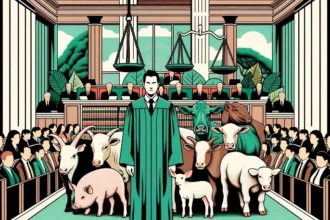Unveiling the Complexity of Libertarian Ethics in Animal Rights
In the realm of libertarian ethics, a critical and often contentious issue emerges when discussing the rights of animals. Rooted in a deontological legal theory, libertarianism traditionally centers its application on human beings, often excluding non-human entities from its ethical considerations.
- Unveiling the Complexity of Libertarian Ethics in Animal Rights
- The Traditional Rothbardian View and Its Criticisms
- Extending Libertarian Legal Theory to Animals: A Middle Ground
- Evictionism, Children’s Rights, and Their Application to Animal Rights
- Redefining Parental and Guardian Rights in Libertarian Ethics
- The Legal and Ethical Implications for Animals: A Compromise
- Synthesizing Libertarian Ethics with Animal Rights
This exclusion raises profound questions within libertarian circles, particularly regarding the treatment of animals. Notably, the current framework lacks explicit prohibitions against animal abuse and torture – acts universally deemed as morally reprehensible. Some libertarians, acknowledging this gap, propose an expansion of the non-aggression principle (NAP), a cornerstone of libertarian thought, to encompass animal rights.
This article seeks to bridge the gap between these divergent viewpoints. By delving into the continuum of ethical considerations, it aims to offer a principled libertarian resolution that integrates the non-aggression principle with private property rights, thereby addressing the complex issue of animal rights within a libertarian framework.
The Traditional Rothbardian View and Its Criticisms
Murray Rothbard, a prominent figure in libertarian thought, espoused a traditional view on animal rights that has significantly influenced libertarian ethics. According to Rothbard, the scope of libertarian principles, particularly the rights and freedoms it advocates, is exclusively applicable to human beings. This perspective posits that only humans, being rational actors capable of making moral choices and understanding legal obligations, fall within the ambit of libertarian legal and ethical considerations. Rothbard’s view effectively draws a clear demarcation, excluding animals from the sphere of rights and legal protections typically afforded to humans.
Animals are to be included under libertarian legal theory, granting them the same rights as non-rational humans.
However, this traditional Rothbardian stance on animal rights has not been without its critics within the libertarian community. One of the core criticisms lies in its seemingly arbitrary boundary-setting in determining the subjects of legal and ethical consideration. Critics argue that if libertarianism, in its current form, can include unborn humans in discussions about rights and legal protection, as evidenced in debates on abortion, then why should it not extend its protective mantle beyond the confines of human species? This argument challenges the species-specific limitations of Rothbard’s view, calling for a more inclusive and expansive approach.
Critics propose a reevaluation of the boundaries of legal protection, suggesting that the criteria should not be limited to species membership. Instead, they argue for a broader ethical consideration that transcends species lines. This perspective echoes broader philosophical discussions about the nature of rights and who qualifies for them, questioning whether the capacity for rational thought and legal petitioning should be the sole criteria for ethical and legal consideration.
The essence of this criticism is the call for a more inclusive libertarian framework, one that accommodates a wider range of beings within its ethical scope. This approach necessitates a rethinking of traditional libertarian views, urging an extension of libertarian principles to encompass not just humans but potentially other sentient beings who, despite their inability to petition for their rights, may still warrant moral and legal consideration. This debate within libertarian circles highlights the ongoing evolution of ethical thought and the complexities of applying philosophical principles to real-world issues like animal rights.
Extending Libertarian Legal Theory to Animals: A Middle Ground
In the context of libertarian ethics, a compelling proposition emerges: the extension of legal rights to animals. This proposal, drawing from the theory of evictionism, suggests that just as life is considered to begin at conception for humans, animals too should be included under libertarian legal theory. Consequently, this grants animals the same rights as non-rational humans, such as infants or the intellectually disabled. This approach aligns with the views of those advocating for veganism, recognizing a degree of legal protection for animals.
Animals, akin to human infants or intellectually disabled individuals, warrant a similar degree of protection and consideration.
Considering the practical implications of this theory, we must examine the realms of industrialized farming and animal testing. In traditional libertarian thought, as expounded by Rothbard, activities like the torture or killing of animals for meat or other products, characteristic of industrial farming, are deemed perfectly legal. However, the proposed compromise diverges slightly from this position. It posits that such practices would remain legal only if no alternative care for these animals is available. If no individual or group is willing to assume the responsibility for these animals, their use in industrial farming continues to be permissible under libertarian principles.
The same logic extends to the use of animals for medical or cosmetic testing. Under Rothbardian libertarianism, this is entirely licit. Yet, the compromise introduces a conditional aspect: these practices are permissible only if there is no expressed interest in caring for these specific animals. Should an individual or entity express a desire to care for them, their claim takes precedence, thereby restricting the use of animals for testing purposes under certain conditions.
This nuanced approach represents a middle ground in the libertarian discourse on animal rights. It upholds the fundamental principles of libertarianism, such as property rights and the non-aggression principle, while also expanding the scope of legal consideration to animals. This stance endeavors to bridge the gap between traditional libertarian views and the ethical concerns raised by advocates for animal rights, offering a more inclusive and ethically sensitive libertarian framework.
Evictionism, Children’s Rights, and Their Application to Animal Rights
The theory of evictionism, developed by Walter Block, is a significant perspective within libertarian thought, particularly regarding the rights of unborn humans. This theory posits that human life begins at conception, thus assigning legal rights to fertilized eggs similar to those of non-rational humans, such as children or the intellectually disabled. This evictionist view, despite its assumption that life begins at conception, supports a pro-choice stance, allowing a woman to remove an unborn baby from her womb at any stage of pregnancy for any reason, consistent with traditional libertarian principles.
Libertarian ethics challenges the traditional notion of absolute parental ownership.
When considering children who have been born or non-lethally evicted from the womb, Murray Rothbard’s libertarian stance on children’s rights becomes relevant. According to Rothbard, parental ownership over children is not absolute but akin to a trusteeship or guardianship. He asserts that every baby, upon birth and no longer being part of the mother’s body, has self-ownership rights. This legal understanding makes it illegal and a violation of the child’s rights for parents to commit acts of aggression, such as mutilation, torture, or murder, against them.
Applying these concepts to animal rights, the paper proposes a novel approach. Mirroring the principles of evictionism, it is suggested that animals are to be included under libertarian legal theory, granting them the same rights as non-rational humans, such as infants or the intellectually disabled. This stance is a point in favor of veganism, as it acknowledges and protects animals’ legal rights within a libertarian framework.
Examining specific practices like industrialized farming and medical or cosmetic testing, this approach offers a balanced view. Under the traditional Rothbardian perspective, activities like animal farming and testing are deemed legal. However, the proposed compromise adds a conditional aspect: these practices remain legal only if there is no interest expressed in caring for these animals. If someone is willing to care for the animals in question, they receive priority, thereby potentially limiting or prohibiting these practices based on the availability of alternative caretakers.
This nuanced interpretation of libertarian ethics regarding animal rights illustrates a thoughtful attempt to reconcile traditional libertarian views with the ethical considerations of animal welfare. It expands the scope of legal rights and protections to include animals, aligning with the broader libertarian principles of non-aggression and property rights.
Redefining Parental and Guardian Rights in Libertarian Ethics
In the landscape of libertarian ethics, the concept of guardianship, particularly concerning dependent beings, occupies a crucial position. This theory challenges the traditional notion of absolute parental ownership, advocating instead for a guardianship or trustee model. According to this perspective, every newborn baby, upon entering the world, inherently possesses self-ownership rights. This fundamental right emanates from their status as separate entities and potential adults, distinct from their mothers. The implication of this is profound: any act of aggression against these vulnerable beings, such as abuse, mutilation, or even murder, is not only unethical but also explicitly illegal within the libertarian framework.
The application of this principle extends beyond human offspring to include other dependent beings, notably animals. This extension represents a significant shift in the conventional understanding of rights and guardianship in libertarian thought. It posits that animals, akin to human infants or intellectually disabled individuals, warrant a similar degree of protection and consideration. This redefined view of guardianship thus broadens the ethical scope of libertarianism, acknowledging the rights and welfare of a wider array of beings.
This expanded interpretation of rights under libertarian ethics underscores a more inclusive and empathetic approach to guardianship. It recognizes the intrinsic value and rights of all dependent beings, whether human or non-human, and calls for their protection against any form of aggression or harm. By doing so, it aligns libertarian principles more closely with contemporary ethical concerns, ensuring that the rights of the most vulnerable are safeguarded within this philosophical framework.
The Legal and Ethical Implications for Animals: A Compromise
In the discourse of libertarian ethics, the proposed compromise regarding animal rights marks a pivotal shift, aligning them closely with the rights of non-rational humans, such as infants and the intellectually disabled. This alignment signifies a notable advancement in the recognition of animal rights within a libertarian framework.
However, this compromise does not present an absolute barrier to the use of animals in certain human activities. It allows for the utilization of animals in sectors like industrial farming and medical testing, but this permission is contingent upon a critical condition: the absence of individuals willing to assume the responsibility for these animals. In scenarios where no alternative care is available or desired for these animals, their use in these practices remains legally permissible. This stipulation introduces a nuanced balance, delicately weighing the ethical considerations for animal welfare against the principles of property rights and personal autonomy that are central to libertarian thought.
This balanced approach seeks to address the ethical concerns surrounding the treatment of animals while maintaining the core tenets of libertarianism. It recognizes the importance of animals’ rights and well-being, while also acknowledging the practical realities and societal needs that involve animal use. This compromise thus reflects a thoughtful consideration of both ethical imperatives and pragmatic necessities, aiming to find a middle ground that respects both animal welfare and human interests within the libertarian ethical framework.
Synthesizing Libertarian Ethics with Animal Rights
The intricate exploration of libertarian perspectives on animal rights uncovers a multifaceted and nuanced debate that stretches the boundaries of traditional libertarian thought. At the heart of this discourse is the integration of two fundamental principles: the non-aggression principle (NAP) and the doctrine of private property rights. By weaving these core tenets into the fabric of the discussion on animal rights, a principled libertarian compromise emerges, one that balances ethical considerations with libertarian values.
This compromise not only acknowledges but actively recognizes the rights of animals, positioning them within the libertarian legal and ethical sphere in a manner previously unexplored. It challenges the traditional libertarian view that has typically reserved rights and protections for rational human beings alone. By extending these rights to animals, the compromise aligns with contemporary ethical concerns, reflecting a growing societal awareness of animal welfare and rights.
Simultaneously, this approach upholds the foundational values of libertarianism, particularly the respect for property rights and personal autonomy. It navigates the complex terrain of ethical dilemmas and practical realities, seeking a harmonious balance between animal welfare and human interests. This approach does not demand a radical overhaul of libertarian principles but instead calls for a thoughtful expansion and application of these principles in a manner that is inclusive of animal rights.
In essence, this compromise represents a sophisticated and ethically consistent approach to resolving the animal rights debate within the libertarian framework. It is a testament to the adaptability and relevance of libertarian ethics in addressing modern ethical challenges. This balanced perspective offers a blueprint for how libertarian thought can continue to evolve, remaining true to its core principles while expanding its moral horizon to include a broader spectrum of sentient beings.
Adapted from an academic article for a wider audience, under license CC BY 4.0









